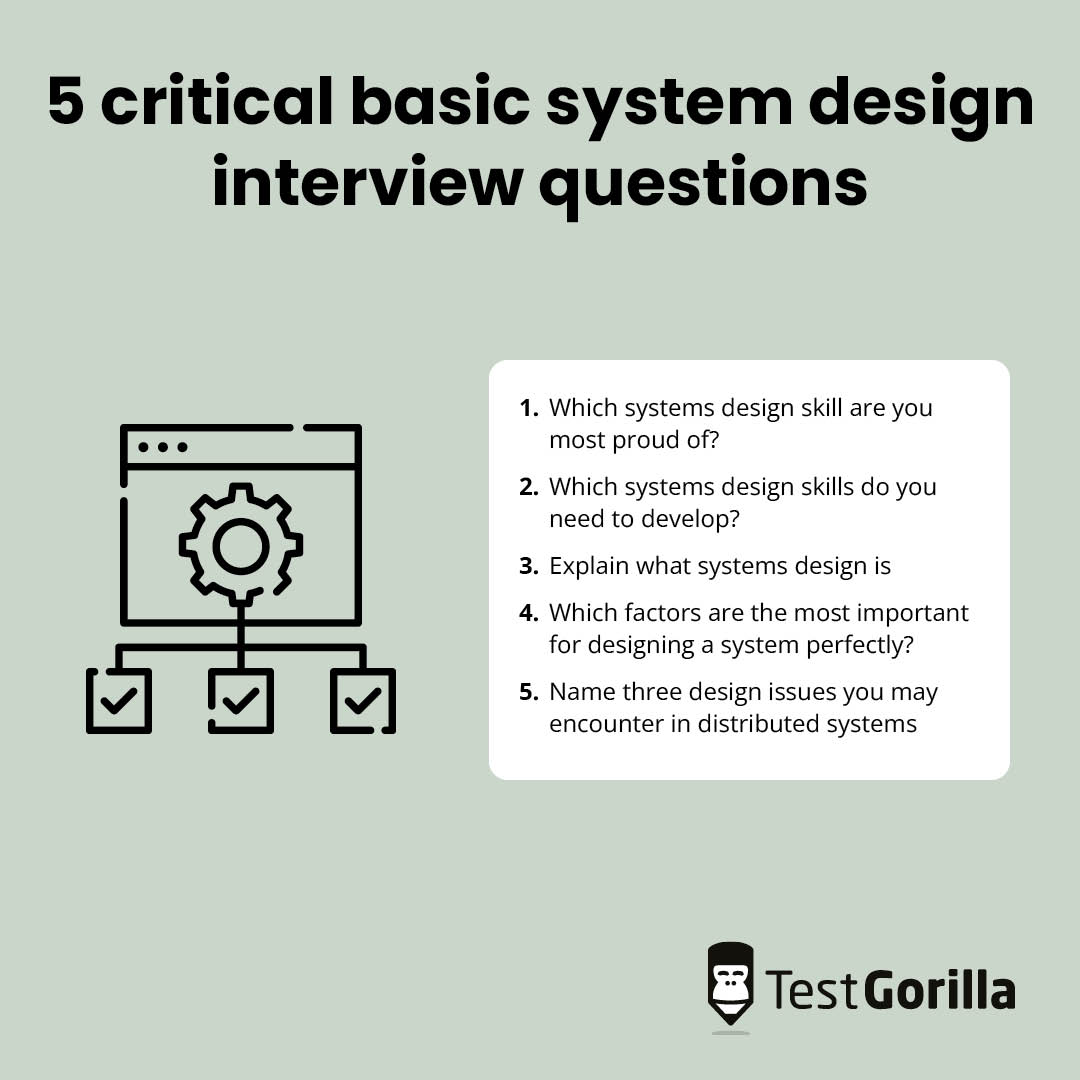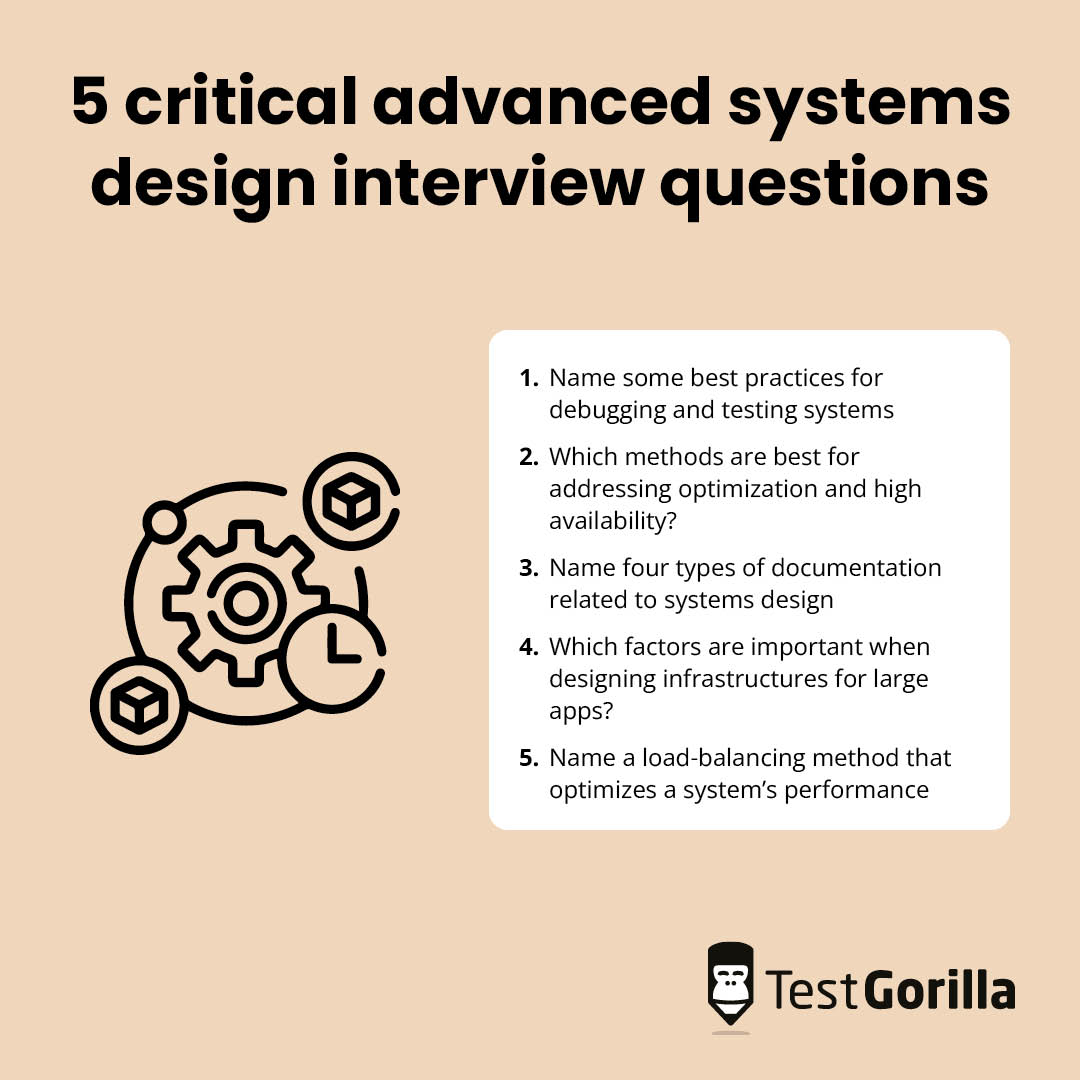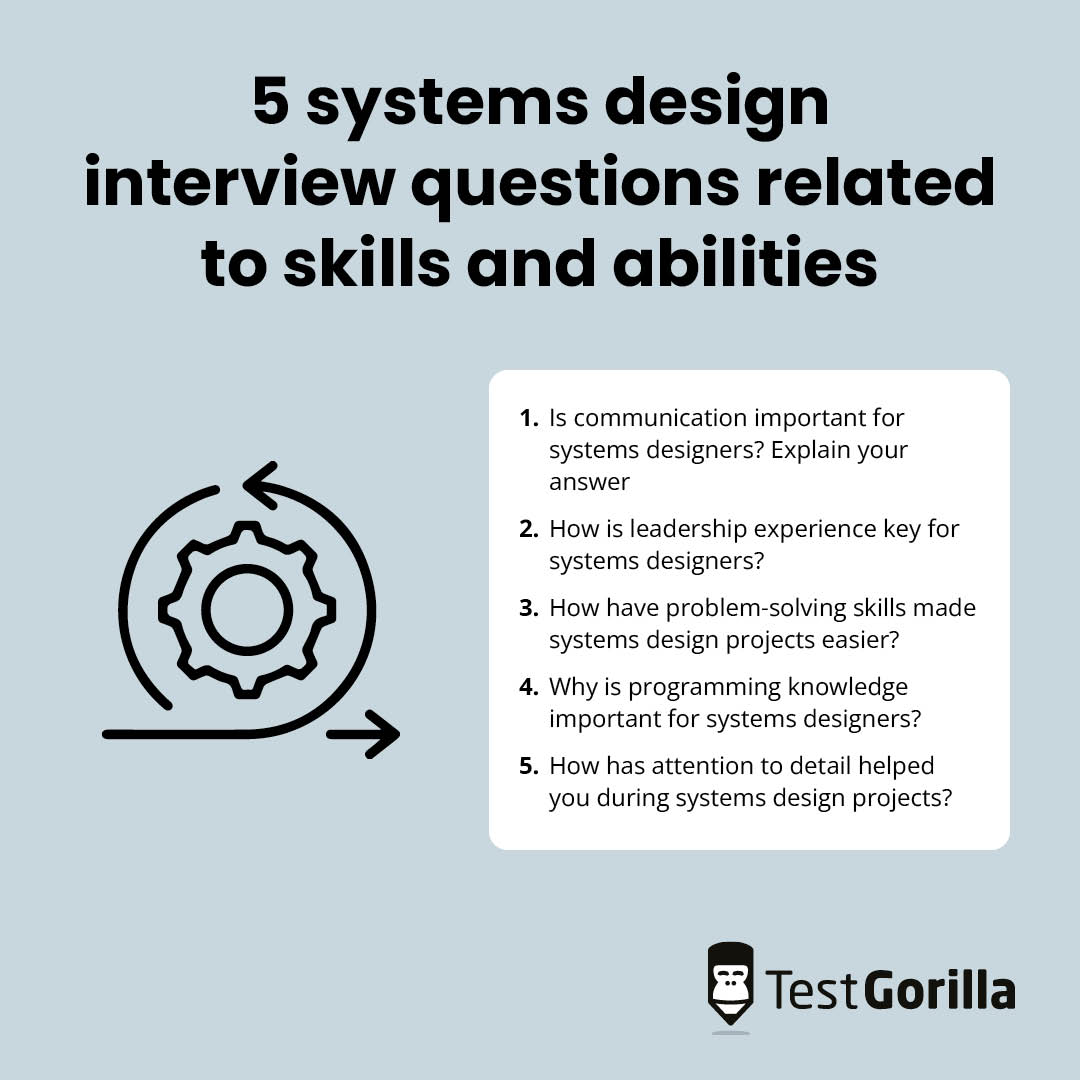45 system design interview questions to ask systems designer applicants
How can you tell if your next systems designer fits your company well? Which method is ideal for discovering if they can identify, design, and build systems that align with your organization’s specific expectations?
Narrowing down the full range of skills you need to assess when hiring a systems designer can be overwhelming.
The good news is you can make the hiring process easier by giving candidates skills tests like our Project Management test and then following up with an interview.
You may find it challenging to select the most suitable interview questions to pinpoint the perfect candidate. Fortunately, we have a solution. Choose from this list of 45 systems design interview questions to hire the right systems designer for your team.
Table of contents
- Basic systems design interview questions to ask junior applicants
- 5 critical basic system design interview questions and answers
- Advanced systems design interview questions to ask senior applicants
- 5 critical advanced systems design interview questions and answers
- 5 systems design interview questions and answers related to skills and abilities
- What are the advantages of using skills assessments to hire systems designers?
- How should you incorporate skills testing into your hiring process?
- Why and how should you use skills testing for onboarding processes?
- Discover top systems designers with skills tests and systems design interview questions
Basic systems design interview questions to ask junior applicants
Ask applicants these systems design interview questions to learn if they have the basic system design skills and experience needed to join your business.
Explain what the CAP theorem is.
Explain what systems design is.
Which factors are the most important for designing a system perfectly?
What is the ideal tool for structured design?
Define horizontal scaling.
Define vertical scaling.
Explain the difference between horizontal and vertical scaling.
Describe your experience as a systems designer.
Which systems design skill are you most proud of?
Which systems design skills do you need to develop?
Explain what load balancing means.
Describe why load balancing is essential in systems design.
Define system latency in systems design.
Define throughput in the context of systems design.
Define availability in the context of systems design.
Explain what sharding means.
Explain what partitioning means.
Is there a difference between partitioning and sharding? Explain your answer.
Describe the relationship between scalability and performance.
Define caching and name two cache update strategies related to systems design.
Tell me what you know about CDNs (content delivery networks).
What is a push CDN?
What is a pull CDN?
Tell me what you know about leader election processes.
Name three design issues you may encounter in distributed systems.
Is there a difference between NoSQL and SQL databases? Explain your response.
5 critical basic system design interview questions and answers
Check the answers to these five essential basic system design interview questions when reviewing your applicants’ responses to assess their knowledge.
1. Which systems design skill are you most proud of?
This systems design interview question will prompt candidates to describe their strongest systems design skill or the one that helps them complete challenging work.
You may receive many answers that indicate applicants’ familiarity with systems design. The trick is to listen for responses that explain why the skills are important – the why is just as important as the what.
From database management to application development, skills related to systems design can help professionals create systems designs according to a company’s technical specifications.
Since database management skills are vital, consider evaluating your applicants’ abilities in this area with our Database Management and Administration test.
2. Which systems design skills do you need to develop?
Whether applicants lack knowledge of operating systems or IT skills related to systems design, they should always mention the methods and techniques they use to build and develop skills when responding to this systems design interview question.
As they respond, look for signs that they are continuously upskilling by completing courses such as a bachelor’s degree or building work experience.
If you’re searching for ways to assess the skills your candidates lack, look through our skills test library. Some system-design-related tests you may consider include our Windows Server Administration and Project Management tests.
3. Explain what systems design is
Systems design is a process in which system designers establish the elements of a system, including components and interfaces, system architecture, and modules. The process involves identifying, planning, and building systems that align with an organization’s objectives.
Skilled applicants may elaborate further and explain that system analysis, patterns in system architecture, and using APIs are the main priorities for systems designers. These responsibilities reduce maintenance and financial costs and enhance the end-user experience.
4. Which factors are the most important for designing a system perfectly?
There are more than 14,271 system design engineers in the US, and many are proficient in their field. If your applicants have experience with designing perfect systems, they should know that several factors facilitate the system design process, including the following:
Ensuring the system is well documented
Enhancing the user-friendly aspects of the system
Building a system that can store its users’ data
Creating a well-ranked system
5. Name three design issues you may encounter in distributed systems
Here are a few types of design issues applicants may mention when answering this systems design interview question:
Security issues: Systems designers must maintain the confidentiality and integrity of distributed systems, which can be a difficult task
Scalability issues: Systems designers should understand how to plan scalable distributed systems to handle varying user loads
Openness issues: Systems designers need to know that systems should be capable of extension or re-implementation, including sharing new services for clients
Advanced systems design interview questions to ask senior applicants
Review your senior systems designers’ skills by asking them these advanced system design interview questions:
Describe some best practices for debugging and testing systems.
Outline four steps for designing a URL-shortening service.
Which methods are best for addressing optimization and high availability?
Which method is ideal for addressing system requirements in systems design?
Which method is best for designing a system’s data architecture?
Describe your method for designing an API for third-party external developers.
Which factors are important when designing infrastructures for large apps?
Name a load-balancing method that optimizes a system’s performance.
Explain how you would design a web crawler.
Explain how you would design a recommendation system.
Which factors are important for developing autocomplete functionality?
At which point in the systems design process should you conduct a system analysis?
Name four types of documentation related to systems design.
Explain how you would design a library management system.
5 critical advanced systems design interview questions and answers
Here are examples of good answers to five important advanced system design interview questions. Review your applicants’ responses against these answers to identify top talent.
1. Name some best practices for debugging and testing systems
The demand for debugging and testing skills is rising. In 2020 alone, there was a 10% increase in the number of organizations employing more than 16 dedicated testers. That’s why it’s crucial to assess system designers’ debugging skills accurately and efficiently to hire the best candidates before your competition.
Candidates may understand how to debug and test, but they should also know the best practices to ensure systems operate optimally over time.
For instance, they should know that debugging and testing systems require an iterative method and frequent system refinement. They should also be aware that well-defined test cases and third-party tools can make the process easier.
2. Which methods are best for addressing optimization and high availability?
Applicants should describe methods that account for optimization, high availability, and scalability.
To optimize performance, systems designers should identify any resource-intensive components and use methods that ensure those components can accommodate high loads.
Addressing high availability involves a couple of methods. Systems designers should make sure the system can recover from failures by following the appropriate protocols and prevent downtime by adding redundancies to their designs.
3. Name four types of documentation related to systems design
Several types of documentation are required for systems design. The following are four examples your applicants may mention:
Source code documentation
Quality assurance documentation
Software architecture documentation
User documentation
Candidates familiar with systems design documentation should understand these documentation types and be able to define their purpose. For instance, they may explain that source code documentation describes what the codebase does and how to use it.
4. Which factors are important when designing infrastructures for large apps?
When designing infrastructures for large apps, applicants should know that it’s important to consider scalability, performance, security, compliance, system monitoring, and data storage.
When answering this interview question, applicants may also explain that designers can enhance a large online application’s infrastructure by caching to minimize query load or breaking down complex tasks into microservices to deploy them separately.
5. Name a load-balancing method that optimizes a system’s performance
The round-robin DNS routing approach is a load-balancing method that optimizes a system’s performance.
Applicants should know that the round-robin method involves redirecting incoming requests to a different hostname or IP address to balance traffic.
5 systems design interview questions and answers related to skills and abilities
Ask candidates these five system design interview questions about skills and abilities to learn more about their experience. Check the answers provided below when reviewing their responses.
1. Is communication important for systems designers? Explain your answer
Technical skills are undoubtedly essential for systems designers, with CRM knowledge alone appearing on 11.7% of resumes. However, soft skills such as communication are also vital.
A systems designer requires excellent communication skills to handle key duties, including explaining tricky systems-related concepts to non-technical individuals. It’s also important for systems designers to be able to communicate with team members to update them on the progress of a project or convey complicated information.
Don’t underestimate the importance of determining whether your candidates’ communication skills are ideal for your business – use our Communication test to assess them.
2. How is leadership experience key for systems designers?
Leadership experience is crucial for systems designers who handle the planning and creation process of system designs with companies and clients. It’s also a core skill that ensures designers can make decisions and communicate effectively when completing system design projects.
Our Leadership & People Management skills test is a fast and efficient method to get insight into your systems designers’ leadership skills and experience.
3. How have problem-solving skills made systems design projects easier?
Since systems designers work with businesses to decipher problems related to information systems, certain problem-solving subskills can make the process easier.
From breaking down the issue to searching for the problem’s cause to researching various solutions, excellent problem-solving skills can help systems designers complete system design projects successfully. Take time to ask the candidate for specific examples that demonstrate their problem-solving abilities.
Getting a preview of your candidates’ problem-solving skills doesn’t have to be difficult. Consider assessing applicants with our Problem Solving skills test.
4. Why is programming knowledge important for systems designers?
Systems designers design and write systems and software. They may also develop operating systems for computers. Therefore, they need to have the right programming skills to build these systems.
Programming knowledge is a key skill that facilitates system programming. Depending on your organization’s requirements, applicants may require skills in Python, C++, or other programming languages to complete projects.
Our skills tests provide you with an easy way to review your applicants’ skills in specific programming languages, such as Python. Learn more about our Python test or C++ test to assess these abilities.
5. How has attention to detail helped you during systems design projects?
Another key skill applicants should have is excellent attention to detail when creating systems and software. This skill helps design engineers find the optimum technical solution while avoiding errors.
If you want to assess your applicants’ attention to detail, you can use our Attention to Detail (Textual) test on our free trial plan.
What are the advantages of using skills assessments to hire systems designers?
When hiring systems designers, you may encounter three key challenges:
The need to assess multiple skill sets in a short timeframe
The need to compare the many systems designers who apply for your vacancy
The need to avoid unconscious bias when deciding on a shortlist
If you’re a non-technical recruiter or lack personal experience and knowledge of systems design, you may also be unsure which skills to assess or how to assess them.
Skills assessments are the secret solution for all of these challenges.
They work by providing you with a results-driven approach to candidate selection. Not only do assessments enable you to evaluate various systems design subskills thanks to the many skills tests you can select, but they also help you compare applicants and avoid unconscious bias.
Our skills assessments are also ideal for non-technical recruiters. Subject-matter experts craft each skills test to include specific questions suitable for candidate evaluation.
How should you incorporate skills testing into your hiring process?
When assessing candidates, there are a few steps you can follow to effortlessly incorporate skills testing into your recruitment process.
For a streamlined, efficient hiring process, it’s best to complete skills testing as the first step after candidates respond to your job ad. You should also completely avoid resume evaluation.
After skills testing, your next step should be conducting interviews with candidates using system design interview questions like those mentioned above.
The skills tests will have already provided you with key data about the applicant. You can then use what you know to augment the interview questions. For example, you may ask follow-up questions about an applicant’s operating system knowledge to learn more about their experience.
When you’ve completed both the skills assessments and interviews, you can review both data sets and use a data-driven method to hire the right applicant.
Why and how should you use skills testing for onboarding processes?
In addition to being a key element in the interview process, skills testing can be extremely useful for onboarding processes. You should use skills tests for this part of the hiring process to help prepare the best training sessions for new employees.
So, how should you use skills testing for onboarding? Begin by reviewing the assessment results and checking whether your new hires have any gaps in their knowledge. Do they lack leadership skills? Is their documentation knowledge not as advanced as expected?
Once you know which skills your new employees need to develop, you can create a training program or assign a mentor to teach them the required skills.
Discover top systems designers with skills tests and systems design interview questions
Discovering and hiring the best systems designers is challenging without the right tools and interview questions. But with this comprehensive set of questions and our data-driven systems design skills tests, you’ll quickly find the talent your team needs.
If you want more information about TestGorilla or want to see it in action, sign up for a live 30-minute demo or see how it works for free. Discover the right systems designer with our Software Architect online test, and use our many systems design interview questions to assess them further.
Related posts
Hire the best candidates with TestGorilla
Create pre-employment assessments in minutes to screen candidates, save time, and hire the best talent.
Latest posts
The best advice in pre-employment testing, in your inbox.
No spam. Unsubscribe at any time.

Hire the best. No bias. No stress.
Our screening tests identify the best candidates and make your hiring decisions faster, easier, and bias-free.
Free resources
This checklist covers key features you should look for when choosing a skills testing platform
This resource will help you develop an onboarding checklist for new hires.
How to assess your candidates' attention to detail.
Learn how to get human resources certified through HRCI or SHRM.
Learn how you can improve the level of talent at your company.
Learn how CapitalT reduced hiring bias with online skills assessments.
Learn how to make the resume process more efficient and more effective.
Improve your hiring strategy with these 7 critical recruitment metrics.
Learn how Sukhi decreased time spent reviewing resumes by 83%!
Hire more efficiently with these hacks that 99% of recruiters aren't using.
Make a business case for diversity and inclusion initiatives with this data.






















